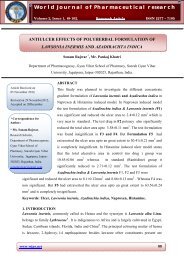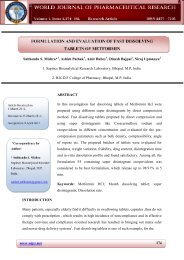World Journal of Pharmaceutical research - WJPR!
World Journal of Pharmaceutical research - WJPR!
World Journal of Pharmaceutical research - WJPR!
Create successful ePaper yourself
Turn your PDF publications into a flip-book with our unique Google optimized e-Paper software.
Manish Gunjan <strong>World</strong> <strong>Journal</strong> <strong>of</strong> <strong>Pharmaceutical</strong> <strong>research</strong><br />
<strong>of</strong> human and onc <strong>of</strong> the oldest documented diseases. An estimated 35 to45 percent <strong>of</strong> all<br />
U.S. women and 20 to 30 percent <strong>of</strong> all U.S. men are trying to lose weight at any given time,<br />
spending up to $40 billion each year to do so. Some <strong>of</strong> these people do not even need to lose<br />
weight. Others need to lose weight but not successful. Still others are successful. Weight- loss<br />
advice, then, does not apply equally to all overweight people. Some people may risk more in<br />
the process <strong>of</strong> losing weight than in remaining overweight. Others may reap significant health<br />
benefits with just modest weight loss. (4) The overweight problem is due to an actual increase<br />
in the fat component, or it can be due to malfunctioning glands. Today, it is estimated that<br />
there are more than 250 million obese people worldwide, equivalent to seven percent <strong>of</strong> the<br />
adult population. (5) In the United States, data from the second National Health and Nutrition<br />
Examination Survey (NHANES II) were used to define obesity in adults as a BMI <strong>of</strong> 27.3<br />
kg/m2 or more for women and 27.8 kg/m2 or more for men. These definitions were based on<br />
the gender-specific 85th-percentile values <strong>of</strong> BMI for persons 20 to 29 years <strong>of</strong> age. The<br />
WHO classification assigns an increasing risk for comorbid conditions—including<br />
hypertension, type 2 (non-insulin-dependent) diabetes mellitus, and cardiovascular disease--<br />
to persons with higher BMIs (see Table 1) relative to persons <strong>of</strong> normal weight (i.e., those<br />
with a BMI between 18.5 kg/m2 and 25 kg/m2).The WHO criteria for overweight is (BMI<br />
25 kg/m 2 ) and obesity ( 30 kg/m2), 67% <strong>of</strong> men and 62% <strong>of</strong> women are overweight . (6)<br />
Food intake is modified by a multitude <strong>of</strong> factors – physiological, psychological, and social,<br />
etc. Meal size seems to be controlled by a feedback loop in which signals from the<br />
gastrointestinal tract are transmitted to the hypothalamus after relay in the brainstem. An<br />
important afferent signal is cholecystokinin – a peptide secreted by the duodenum in response<br />
to mechanical and chemical stimuli. Cholecysokinin acts locally on cholecystokinin receptors<br />
in the gastrointestinal tract, the signal being transmitted to the brainstem by the vagus. The<br />
effect is to decrease food intake. Circulating cholecystokinin does not cross the blood-brain<br />
barrier but the peptide is also a neurotransmitter and acts on cholecystokinin B receptors in<br />
the brain to function as a satiety factor. Insulin stimulates leptin release from fat cells and it<br />
enters the CNS where it can decrease food intake by affecting the actions <strong>of</strong> NPY. However,<br />
insulin may also, in some circumstances, increase food intake, presumably indirectly, by an<br />
effect on blood glucose. Thus patients with type 2 diabetes mellitus usually gain weight when<br />
treated with insulin or sulfonylureas – an effect that is clinically important. (7) Current<br />
management <strong>of</strong> obesity by pharmacotherapy includes noncentrally acting antiobesity agents<br />
such as Orlistat (Xenical), which inhibits the action <strong>of</strong> the intestinal lipase enzymes and<br />
www.wjpr.net<br />
1251









